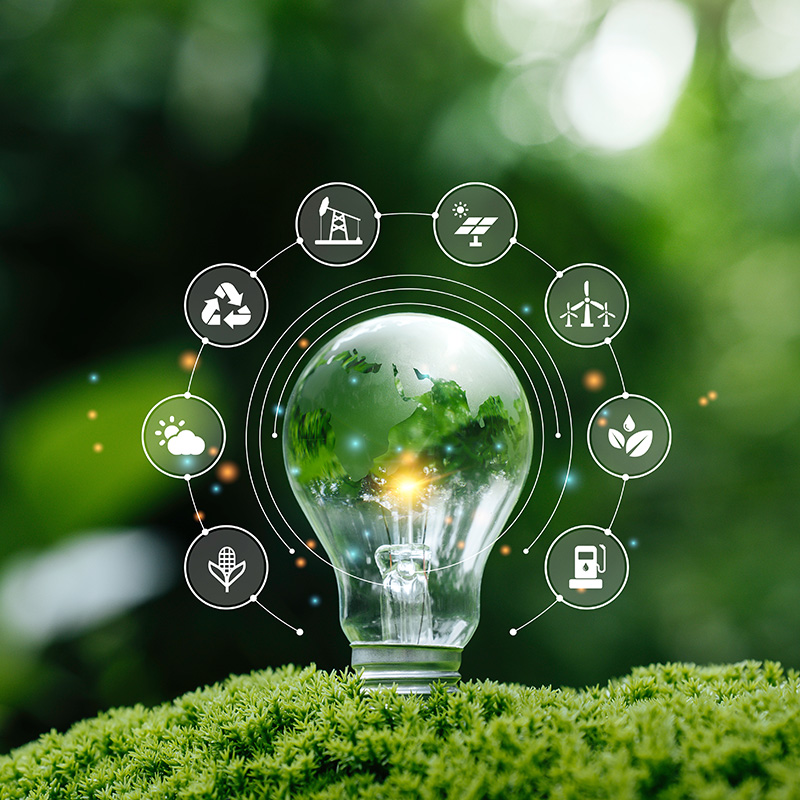
Energy Ecosystem
Creating a clean energy future through science, technology, and policy
Smarter Energy for a Better World
With nationally recognized, energy-focused living labs, pilot facilities, research centers, and interdisciplinary research institutes, the energy ecosystem at Georgia Tech fosters multidisciplinary collaborations to address critical challenges concerning our energy supply and use, climate, and environment. We are creating energy technologies and systems that will provide secure, affordable, and reliable energy now, and into the future. Our facilities provide a platform for our researchers not only in the development of technological solutions, but also aid in deepening their understanding of the economic, environmental, political, and social implications of energy generation, distribution, and use.
Our commitment to creating better ways to utilize current fuel sources while maximizing efficiency and minimizing the environmental impacts is unparalleled. At Georgia Tech, energy innovation is everywhere, spanning all seven colleges and fostering a multidisciplinary approach to solving the most pressing energy problems.
Living Labs and Experimental Test Beds
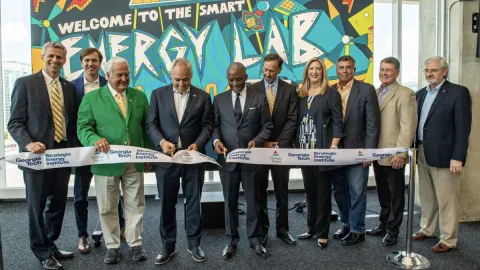
Microgrid
The Tech Square Advanced Microgrid is a Georgia Power Company project for Georgia Tech’s CODA marquee development in midtown Atlanta. Serving the CODA’s High Power Computing Center (HPCC) is a first-of-its-kind urban microgrid, that has been optimized to fit into a confined site footprint.
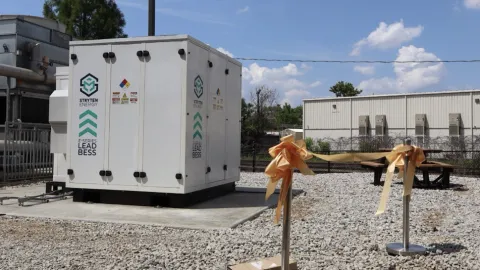
Stryten Lead Battery Energy Storage System
The Lead Battery Energy Storage System (BESS) storage unit, situated directly behind the Carbon Neutral Energy Solutions building on the Georgia Tech campus, serves as the first living lab battery pilot at Georgia Tech. As an essential component of the Distributed Energy Resources puzzle, this system plays a crucial role in advancing energy solutions research.
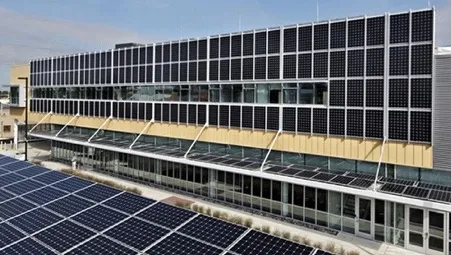
Carbon Neutral Energy Solutions Laboratory
The Carbon Neutral Energy Solutions Laboratory is designed to foster industry collaboration and support translational and pre-commercial research in clean, low carbon energy technologies. Research spans all aspects of the energy cycle from production and generation to distribution and use and are focused on addressing our most pressing energy and environmental challenges. Core research conducted within the lab includes, solar technologies, combustion, gasification, catalysis and bio-catalysis, as well as carbon capture and sequestration.
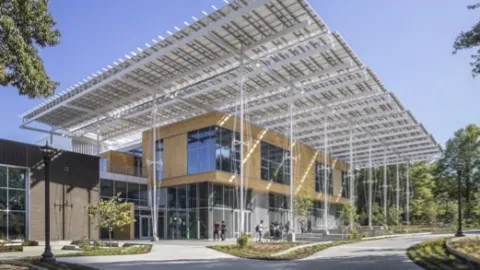
Kendeda Building
The Energy Petal requires net positive energy, which means at least one hundred and five percent of the project’s energy needs must be supplied by on-site renewable energy on a net annual basis, without the use of on-site combustion. As with other natural resources, The Kendeda Building must balance the energy it uses with the energy it is able to harness. Consideration is first given to climate-appropriate passive design, then energy conservation measures, which reduce the size of renewable energy system needed, and, finally, to on-site renewable energy.
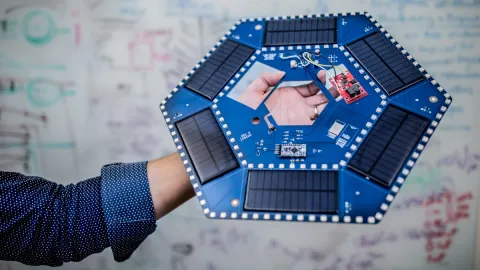
Piezoelectric Sidewalk
The Piezoelectric Sidewalk project at NASA’s Kennedy Space Center Visitor Complex showcases innovative applications of piezoelectric technology for renewable energy in future self-powered smart cities. Developed through a $2 million collaboration between the Georgia Tech Research Institute and Delaware North Corporation, this 40,000-square-foot lighted outdoor footpath generates electricity through mechanical stress—such as footsteps—on embedded piezoelectric materials. Utilizing lead zirconate titanate, the material with the highest known piezoelectric response, the project demonstrates how energy harvesting from everyday human movement can contribute to sustainable infrastructure solutions.
Pilot Manufacturing Facilities
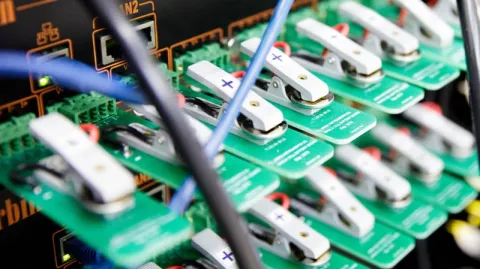
Georgia Tech Advanced Battery Center
The Georgia Tech Advanced Battery Center (GTABC) unites the expertise of Georgia Tech’s faculty and students to create the next battery technologies for electric vehicles, grid energy storage, electric aviation, and other applications.
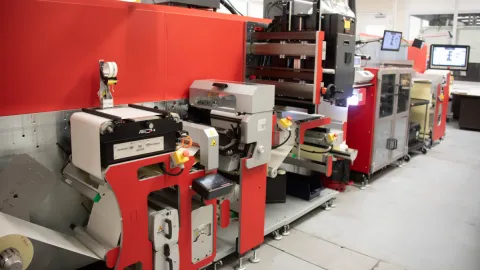
Roll-to-Roll Manufacturing
The modular pilot-scale roll-to-roll (R2R) facility at Georgia Tech serves as a testbed for scaling up manufacturing research. R2R manufacturing transforms flexible substrate materials into complex rolls by coating them with fluids, which are then dried or cured. This efficient method is ideal for sustainably producing components for solar cells, batteries, flexible electronics, and separations—industries that have recently expanded in Georgia, in addition to other thin film materials used in other industries.
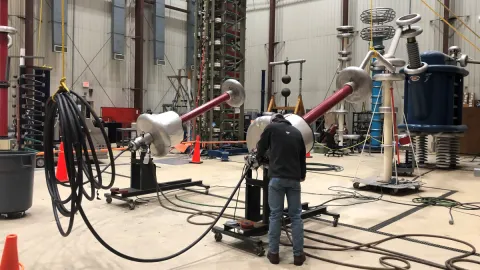
National Electric Energy Testing, Research, & Applications Center
Georgia Tech’s National Electric Energy Testing, Research, & Applications Center (NEETRAC) provides value-oriented research and testing services for the electric energy delivery industry, including electric utilities and manufacturers.
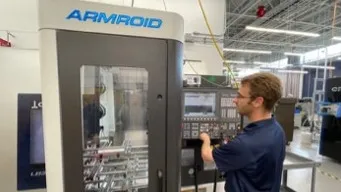
Advanced Manufacturing Pilot Facility
The Advanced Manufacturing Pilot Facility (AMPF) is a 20,000 square foot reconfigurable research and development high bay manufacturing facility in Midtown Atlanta supporting industrial, academic, and government stakeholders that also serves as a teaching laboratory. AMPF is a resource and key partner for SBIR/STTR development.
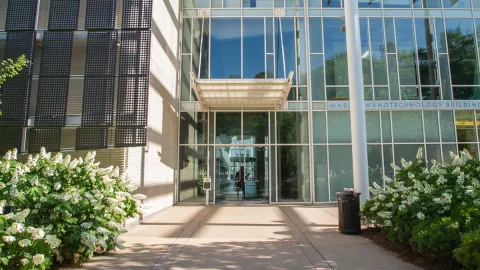
Institute for Matter and Systems Core Facility
The Institute for Matter and Systems (IMS) operates state-of-the-art electronics and nanotechnology core facilities at Georgia Tech, offering a broad range of fabrication and characterization capabilities for activities from basic discovery to prototype realization.
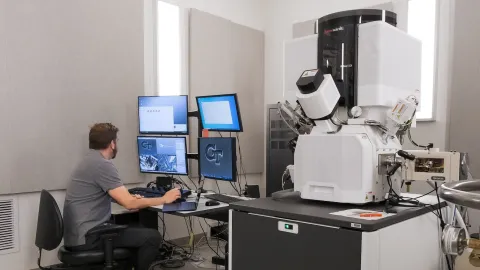
Characterization Lab
Within the Institute of Matter and Systems (IMS) facilities, the Characterization Lab encompasses state-of-the-art resources for materials analysis, including the Materials Characterization Facility (MCF), Mechanical Properties Characterization Facility (MPCF), and Organic Materials Characterization Lab. These labs offer advanced imaging, mechanical testing, and molecular analysis tools, supported by expert staff to assist with research and development across academic, industry, and government sectors.
Centers

Energy Policy and Innovation Center
The Energy Policy and Innovation Center (EPIcenter) at Georgia Tech was launched in the Fall of 2016 to conduct research, provide information, and coordinate related activities with policy and community leaders and innovators in the energy industry. By partnering with a variety of individuals and organizations, such as scientists, researchers, utility companies, and nonprofits, the Center explores the intersection of policy and technology and draws upon the extensive expertise in the Southeast.
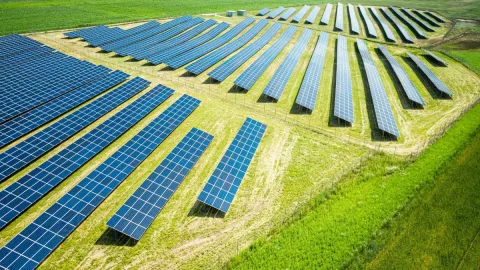
Center for Critical Mineral Solutions
The Center for Critical Mineral Solutions provides an interdisciplinary umbrella where critical mineral research and solutions can convergence, and sets the stage for regional collaboration and development. Our mission is to develop innovative solutions and train the future workforce for sustainable critical mineral production, which will be achieved through three interwoven pillars: research and development, strengthening collaborations with regional universities, and developing regional resources and economy.

Center for Organic Photonics and Electronics
The Georgia Tech Center for Organic Photonics and Electronics (COPE) is a premier national and resource center that creates flexible organic photonic and electronic materials and devices that serve the information technology, telecommunications, energy, and defense sectors. COPE creates the opportunity for disruptive technologies by developing new materials with emergent properties and by providing new paradigms for device design and fabrication.
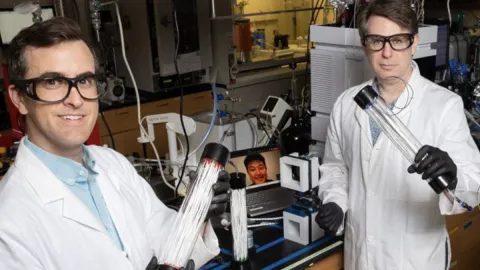
Direct Air Capture Center
Georgia Tech’s Direct Air Capture Center (DirACC), launched with the support of the Strategic Energy Institute (SEI), is co-directed by Professors Christopher W. Jones and Matthew J. Realff. DirACC has created a forum for collaborative research on NETs and DAC, bringing together researchers from across the Institute working in energy, sustainability, policy, and related fields who work in cooperation with our corporate Center members on pre-competitive projects relevant to DAC and NETs.
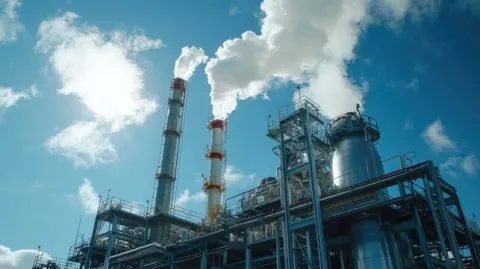
Energy Frontier Research Centers
Established in 2014, the center for Understanding and Control of Acid Gas-Induced Evolution of Materials for Energy (UNCAGE-ME) was one of 10 new Energy Frontier Research Centers (EFRCs) financed with a four-year $11.2 million grant from the U.S. Department of Energy (DOE). The focus of the UNCAGE-ME EFRC is to advance the understanding of how porous and electrochemical materials used for hydrogen production and carbon dioxide capture and conversion evolve and degrade when exposed to emerging contaminants.
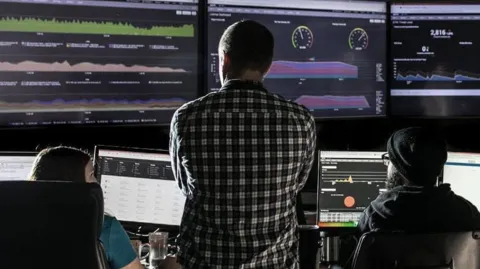
Institute for Cybersecurity and Resilient Infrastructure Studies
The Institute for Cybersecurity and Resilient Infrastructure Studies (ICARIS) is a joint research collaboration between Georgia Tech and the U.S. Department of Energy’s Pacific Northwest National Laboratory. The mission of ICARIS is to deliver the technologies, test beds, and talent necessary to secure the nation’s critical infrastructure.
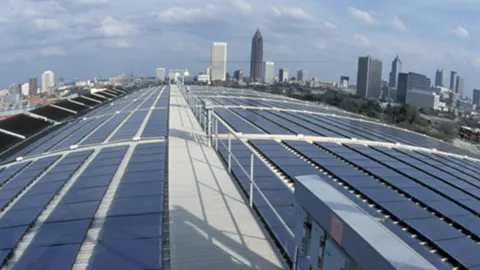
University Center of Excellence for Photovoltaics
The Department of Energy (DOE) established a University Center of Excellence for Photovoltaics Research and Education (UCEP) at Georgia Tech in 1992, one of two such centers in the United States. The Center, under the direction of Dr. Ajeet Rohatgi, reports through Georgia Tech’s Office of Interdisciplinary Programs. The mission of the Center is to improve the fundamental understanding of the science and technology of advanced PV devices, to fabricate record high efficiency solar cells, to provide training and enrich the educational experience of students in this field, and to give the U.S. a competitive edge by providing guidelines to industry and the DOE for achieving cost-effective and high-efficiency PV devices.
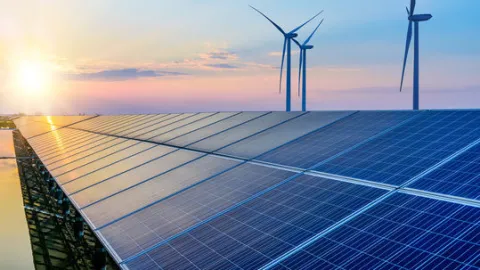
South East Direct Air Capture Hub
The Southeast DAC (SEDAC) Hub supports the deployment of Direct Air Capture (DAC) technologies in northern Mobile County, Alabama. DAC is a process designed to reduce carbon dioxide (CO2) levels in the atmosphere by capturing CO2 directly from the air. The CO2 is then stored safely and securely. The SEDAC Hub is one of five Topic Area 2 projects chosen by the federal government to receive funding in order to establish a regional DAC hub.
Labs and Initiatives
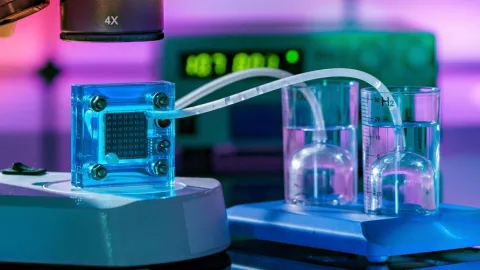
Hydrogen Initiative
The Georgia Institute of Technology has a broad range of testbeds, industry partnerships, and federal programs across the hydrogen value chain, including hydrogen production, storage/transport, and utilization. Georgia Tech is also focused on developing diverse STEM talent for such industries.
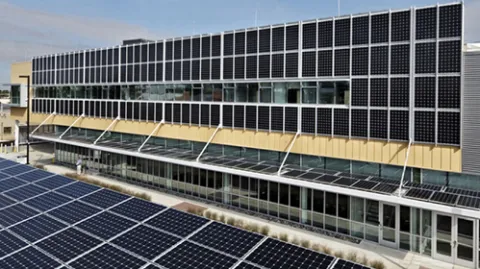
Carbon Neutral Energy Solutions Laboratory
The Carbon Neutral Energy Solutions Laboratory is designed to foster industry collaboration and support translational and pre-commercial research in clean, low carbon energy technologies. Research spans all aspects of the energy cycle from production and generation to distribution and use and are focused on addressing our most pressing energy and environmental challenges. Core research conducted within the lab includes, solar technologies, combustion, gasification, catalysis and bio-catalysis, as well as carbon capture and sequestration.
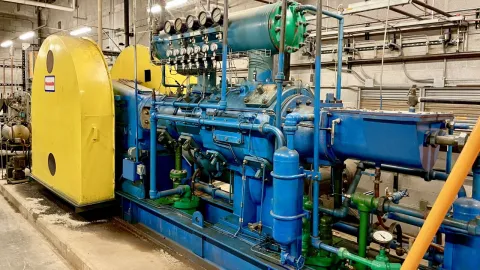
Ben T. Zinn Combustion Laboratory
The Ben T. Zinn Combustion Laboratory is a state-of-the-art research facility dedicated to the study of combustion and fluid mechanical phenomena, and is home to the largest gas turbine combustion research group in the United States.
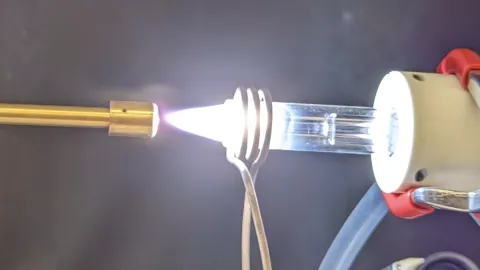
Hypersonics Center of Excellence
The Georgia Tech Hypersonics Center of Excellence is a multi-disciplinary collaboration across Georgia Tech and the Georgia Tech Research Institute (GTRI). The mission of the center is to develop new capabilities, transition technologies, and train the future work force in order to enhance U.S. technological leadership and ensure national security.
Interdisciplinary Research Institutes
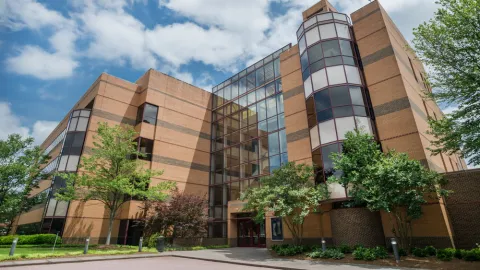
Renewable Bioproducts Institute
Georgia Tech’s Renewable Bioproducts Institute (RBI) champions innovation in converting biomass into value-added products, developing advanced chemical and bio-based refining technologies, and advancing excellence in manufacturing processes.

Brook Byers Institute for Sustainable Systems
The Brook Byers Institute for Sustainable Systems (BBISS) is one of Georgia Tech's Interdisciplinary Research Institutes. They build creative solutions to ultimately grow and mobilize Georgia Tech’s knowledge assets to create a sustainable future for all.
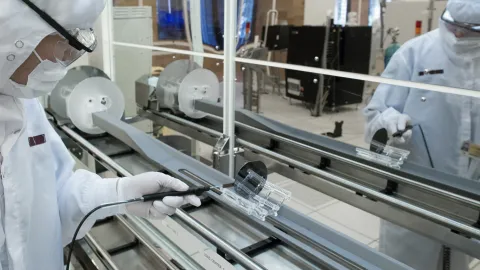
Institute for Matter and Systems
The Institute for Matter and Systems (IMS) is one of Georgia Tech’s Interdisciplinary Research Institutes. The IMS leverages Georgia Tech’s researchers, state-of-the-art facilities, and world class educational programs to facilitate the creation of the systems of tomorrow and their enabling components.
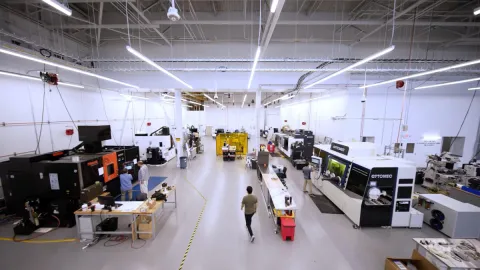
Georgia Tech Manufacturing Institute
The Georgia Tech Manufacturing Institute (GTMI) is one of Georgia Tech's ten interdisciplinary research institutes (IRI's) and part of the broader Georgia Tech research enterprise. GTMI’s major areas of research and development are on the design and development of advanced manufacturing systems targeting secure digital manufacturing, additive and subtractive processes, and large-scale production enterprises.

Space Research Institute
Georgia Tech’s Space Research Institute (SRI) is composed of faculty and staff across campus who have a common interest in space exploration and discovery. Collectively, we research a wide range of topics on space and how it relates to our human perspective. SRI is the ultimate hub of all things space related at Georgia Tech connecting all the research institutes, labs, facilities, and colleges to pioneer the conversation about space in the state of Georgia.
